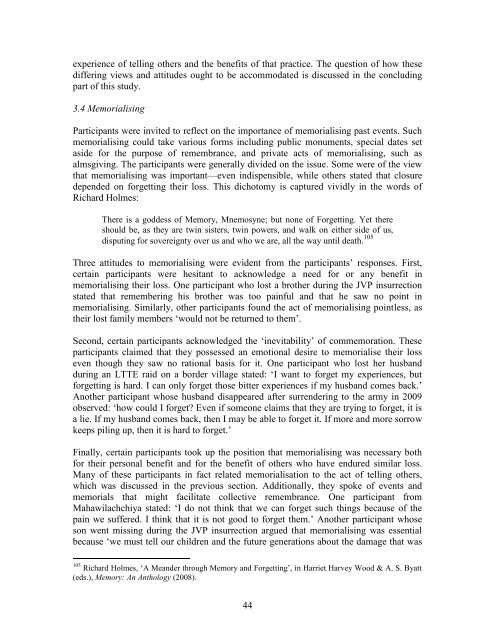Confronting the Complexity of Loss
truth memory justice_final- 11st sep 2015
truth memory justice_final- 11st sep 2015
- No tags were found...
You also want an ePaper? Increase the reach of your titles
YUMPU automatically turns print PDFs into web optimized ePapers that Google loves.
experience <strong>of</strong> telling o<strong>the</strong>rs and <strong>the</strong> benefits <strong>of</strong> that practice. The question <strong>of</strong> how <strong>the</strong>se<br />
differing views and attitudes ought to be accommodated is discussed in <strong>the</strong> concluding<br />
part <strong>of</strong> this study.<br />
3.4 Memorialising<br />
Participants were invited to reflect on <strong>the</strong> importance <strong>of</strong> memorialising past events. Such<br />
memorialising could take various forms including public monuments, special dates set<br />
aside for <strong>the</strong> purpose <strong>of</strong> remembrance, and private acts <strong>of</strong> memorialising, such as<br />
almsgiving. The participants were generally divided on <strong>the</strong> issue. Some were <strong>of</strong> <strong>the</strong> view<br />
that memorialising was important—even indispensible, while o<strong>the</strong>rs stated that closure<br />
depended on forgetting <strong>the</strong>ir loss. This dichotomy is captured vividly in <strong>the</strong> words <strong>of</strong><br />
Richard Holmes:<br />
There is a goddess <strong>of</strong> Memory, Mnemosyne; but none <strong>of</strong> Forgetting. Yet <strong>the</strong>re<br />
should be, as <strong>the</strong>y are twin sisters, twin powers, and walk on ei<strong>the</strong>r side <strong>of</strong> us,<br />
disputing for sovereignty over us and who we are, all <strong>the</strong> way until death. 105<br />
Three attitudes to memorialising were evident from <strong>the</strong> participants’ responses. First,<br />
certain participants were hesitant to acknowledge a need for or any benefit in<br />
memorialising <strong>the</strong>ir loss. One participant who lost a bro<strong>the</strong>r during <strong>the</strong> JVP insurrection<br />
stated that remembering his bro<strong>the</strong>r was too painful and that he saw no point in<br />
memorialising. Similarly, o<strong>the</strong>r participants found <strong>the</strong> act <strong>of</strong> memorialising pointless, as<br />
<strong>the</strong>ir lost family members ‘would not be returned to <strong>the</strong>m’.<br />
Second, certain participants acknowledged <strong>the</strong> ‘inevitability’ <strong>of</strong> commemoration. These<br />
participants claimed that <strong>the</strong>y possessed an emotional desire to memorialise <strong>the</strong>ir loss<br />
even though <strong>the</strong>y saw no rational basis for it. One participant who lost her husband<br />
during an LTTE raid on a border village stated: ‘I want to forget my experiences, but<br />
forgetting is hard. I can only forget those bitter experiences if my husband comes back.’<br />
Ano<strong>the</strong>r participant whose husband disappeared after surrendering to <strong>the</strong> army in 2009<br />
observed: ‘how could I forget? Even if someone claims that <strong>the</strong>y are trying to forget, it is<br />
a lie. If my husband comes back, <strong>the</strong>n I may be able to forget it. If more and more sorrow<br />
keeps piling up, <strong>the</strong>n it is hard to forget.’<br />
Finally, certain participants took up <strong>the</strong> position that memorialising was necessary both<br />
for <strong>the</strong>ir personal benefit and for <strong>the</strong> benefit <strong>of</strong> o<strong>the</strong>rs who have endured similar loss.<br />
Many <strong>of</strong> <strong>the</strong>se participants in fact related memorialisation to <strong>the</strong> act <strong>of</strong> telling o<strong>the</strong>rs,<br />
which was discussed in <strong>the</strong> previous section. Additionally, <strong>the</strong>y spoke <strong>of</strong> events and<br />
memorials that might facilitate collective remembrance. One participant from<br />
Mahawilachchiya stated: ‘I do not think that we can forget such things because <strong>of</strong> <strong>the</strong><br />
pain we suffered. I think that it is not good to forget <strong>the</strong>m.’ Ano<strong>the</strong>r participant whose<br />
son went missing during <strong>the</strong> JVP insurrection argued that memorialising was essential<br />
because ‘we must tell our children and <strong>the</strong> future generations about <strong>the</strong> damage that was<br />
105 Richard Holmes, ‘A Meander through Memory and Forgetting’, in Harriet Harvey Wood & A. S. Byatt<br />
(eds.), Memory: An Anthology (2008).<br />
44



